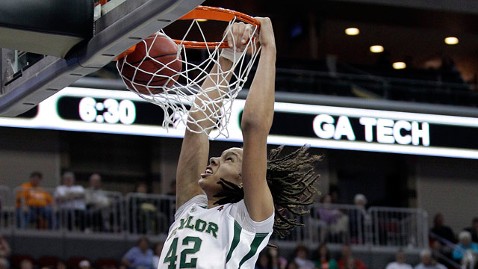Why Can't Women Dunk?

(Charlie Neibergall/AP Photo)
Well, as Baylor University's Brittney Griner so demonstratively proved twice this week, they can dunk, but they sure don't do it very often.
When Griner, a 6-foot-8 junior, dunked Tuesday in Baylor's 76-57 victory over Florida, she became just the second woman to dunk in an NCAA tournament game - and the first since 2006. When she dunked again Saturday in an 83-68 victory over Georgia Tech, she tied the record for most dunks by a woman in the tournament.
Griner, who has recorded double-doubles in 100 of her 102 college games and is the first player to score 2000 points and block 500 shots in her career, hardly needs to dunk to be imposing, but her coach says it wouldn't hurt.
"I think she's gotten away from trying to be monstrous with her going to the rim," Baylor coach Kim Mulkey said after the game Tuesday. "I told her about two weeks ago - I said: 'Even if you miss it, it sends a message.'"
The last woman to dunk in the tournament was Candace Parker of Tennessee, who threw it down twice in a game in 2006 against Army.
Griner's dunk Tuesday was her first of the season, and with the one Saturday, she has seven in her career, tying Parker for the record for a woman's college player.
But a dominant 6-foot-8 male player might dunk seven times in a game. So what's the difference?
According to Dr. Linn Goldberg, a professor of medicine and head of the Division of Health Promotion and Sports Medicine at the Oregon Health and Science University, it likely has to do with differences in height, muscle types and attitude.
Goldberg pointed out that it is not only on the basketball court where we see the difference: In the high jump, the men's record is almost 17 percent higher than the women's.
The key to strength, speed and power are activated fast twitch or Type II muscle fibers, especially type IIb, Goldberg said. Men have more muscle mass, in part due to the amount of testosterone, which is a naturally produced anabolic steroid, and thus they have more Type IIb muscle mass.
"Although women do produce some androgen, it is a small amount compared to males, and thus they have less muscle strength and power to jump," Goldberg said. "Testosterone not only increases muscle mass, it also increases the size of motor neurons, which induces more power, which is needed for jumping ability."
Size matters too - since women are not generally as tall as men - but there is obviously still a difference between men and women of the same height, and Goldberg said another factor could be the female mind-set vs. the male.
"I imagine many more women would be able to dunk, but either don't take the opportunity or know full well that a dunk is worth no more points than a layup, a jump shot from within the 3-point perimeter, and less points than a 3-point shot," Goldberg said.
"I may be off the mark, but in general, women are less 'sensation-seeking' than men, and thus may understand that they will not get more points for a dunk, makes them less likely to do something that in the end achieves nothing else but entertainment for the crowd," he said.